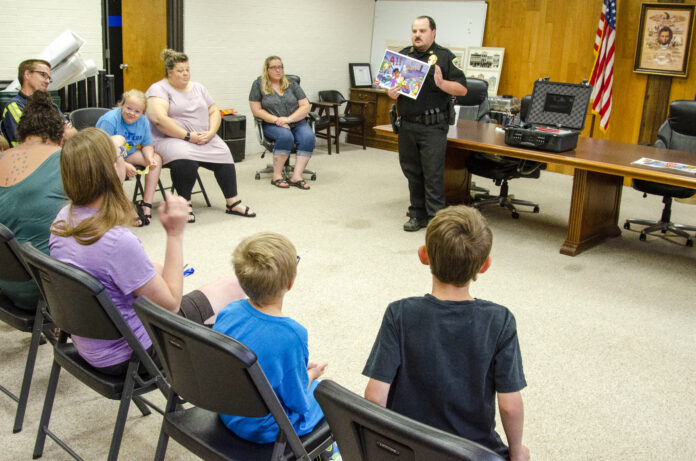By Don Steen ~ Staff Writer • reporter@psci.net
Captain Jake Philipps conducted a Kids Community Training Day at Rockport City Hall Wednesday evening, July 31. The Rockport Police Department recently acquired equipment allowing kids to make 9-1-1 calls on a closed system, allowing younger residents to practice communicating with a dispatcher. Wednesday’s course was the first such session, and it won’t be the last.
Playing the part of dispatcher that evening was Deputy Clerk-Treasurer Megan Vance. While Philipps took participating kids into another room to call via a mobile phone, Vance manned the mobile dispatch center in the council chambers. Kids were posed with various scenarios and challenged to communicate important information to dispatch to speed help along.
“If you ever have to call, we want you to know what to do,” said Vance.
The mobile phone connected only to the practice dispatch set, allowing kids to dial 9-1-1 and simulate the full experience without accidentally connecting to the real network. Hypothetical scenarios ranged from house fires to accidents with injuries.
Philipps also broke down the difference between a 9-1-1 emergency and something that should be resolved by a trusted adult. A missing cat, for example, should be reported to a parent or guardian.
“I love my cat,” he joked. “But just because my cat is missing I can’t call 9-1-1.”
A missing sibling or other child, however, certainly falls under the purview of emergency.
Philipps noted that kids may find themselves in situations where they are alone, or where the people they are with are incapacitated. An automobile accident, for example, could leave a child as the sole uninjured party. In that situation, he pointed out some things a caller might want to share with a dispatcher to help locate the accident scene. Ideally, emergency responders could simply trace the phone signal, but if a child can identify a landmark such as a restaurant, park, or large sign that can help narrow things down.
Other 9-1-1 situations could include a personal injury, such as a badly hurt ankle without any adult nearby to help. In the case of a fire, Philipps stressed that evacuation takes precedence over making the call for help. In the event that someone is trapped, it is critical that emergency responders be informed so they can respond appropriately when they arrive.
Philipps also encouraged families to get to know their neighbors and establish a network of local trusted individuals, so that kids have someone to reach out to before help arrives.
“It’s always good to have a backup plan,” he said.









